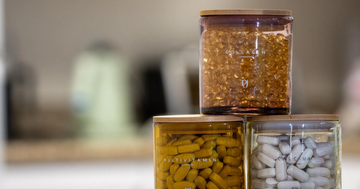If you’ve ever wondered about how to store supplements for maximum potency, you’re not alone. Many people question whether their vitamins are still effective. Proper storage of supplements is often overlooked, yet it plays a crucial role in maintaining their potency and safety. Just like food, supplements can degrade over time if they are not stored correctly.
This blog explores the factors that impact the shelf life of supplements, the influence of environmental conditions, and practical steps you can take at home to protect both your investment and your health.
Why Storage Matters for Supplement Effectiveness
Supplements are composed of active ingredients, such as vitamins, minerals, herbs, or enzymes, that can break down when exposed to heat, light, air, or moisture. When this happens, they lose their potency. In some cases, they can even become unsafe to consume.
For example, vitamin C is particularly sensitive to oxygen and light, while probiotics are vulnerable to heat and moisture. If you’re not storing them properly, you may not be getting the intended health benefits, even if you’re taking the right dosage.
Understand Expiration Dates, But Don’t Rely on Them Alone
All supplements sold in the U.S. are required to have expiration or “best by” dates. These are determined by stability testing under controlled conditions. But what happens once the bottle is in your home can change everything.
If a supplement was stored on a sunny bathroom shelf or near a steamy kitchen stove, its shelf life may be much shorter than the printed date suggests. That’s why storing supplements in the right conditions matters just as much as choosing the right formula.
Where Should You Keep Your Supplements?
The best place to store your supplements is in a cool, dry, dark location, ideally between 59°F and 77°F (15°C–25°C). Closets, bedroom drawers, or kitchen cabinets away from appliances are all good choices.
Avoid the following spots:
Bathrooms: The humidity from showers and baths can introduce moisture into supplement containers, especially if they’re opened frequently.
Kitchens: Heat from stoves, ovens, and even sunlight through windows can cause degradation of sensitive ingredients.
Cars or bags: Leaving supplements in your car or backpack can expose them to fluctuating temperatures, which can be especially damaging to capsules and probiotics.
If you’re using liquid supplements or probiotics that require refrigeration, store them in the fridge immediately after opening, never at room temperature.
Should You Transfer Supplements to Glass Jars or Pill Organizers?
While organizing your supplements may look appealing, transferring pills into other containers can be risky. Manufacturers design original packaging to reduce exposure to air and moisture. Some even use desiccants or UV-blocking bottles to maintain the stability of the contents.
If you’re using a weekly pill organizer for convenience, only fill it with a few days’ worth at a time. And keep the original container sealed and stored properly in the meantime.
What About Childproofing and Safety?
If you live in a home with children or pets, safety should also be part of your storage plan. Always keep supplements out of reach and in child-resistant containers. Many vitamins, especially those containing iron or melatonin, can be dangerous in high amounts.
Store your supplements in higher cabinets or lockable storage boxes if safety is a concern. This also helps you control the environment around your supplements, which keeps them more effective over time.
Watch Out for These Signs Your Supplements Have Gone Bad
Even if stored properly, supplements eventually lose their strength. Here’s how you can tell if something is off:
- The color has changed or faded
- The smell is unpleasant or “off”
- Tablets or capsules are sticking together
- Powdered products have hardened or clumped
- There is visible mold or moisture in the container
If any of these signs appear, it’s time to toss the product, even if the expiration date hasn’t passed.
How Rock Ridge Pharmacy Supports Long-Term Supplement Use
At Rock Ridge Pharmacy, supplements are stored, handled, and shipped with care. Products are sourced from trusted brands that prioritize stability testing, proper packaging, and transparent labeling.
If you’re unsure how to store a specific supplement, such as whether it requires refrigeration or should be kept in a dark place, Rock Ridge Pharmacy’s pharmacists are available to guide you. Their website also features storage information in product descriptions when relevant.
For example, temperature-sensitive items like probiotics and fish oils often come with clear storage directions. Many of these products include protective features like blister packs or amber bottles to reduce exposure to damaging elements.
Recommendations for Common Supplements
While every product is unique, here are general tips for popular supplements:
- Magnesium and Calcium: Keep in dry, room-temperature environments.
- Fish oil or liquid vitamins: Store in the fridge once opened.
- Probiotics: Check if refrigeration is required. Some shelf-stable formulas are fine at room temperature, while others need cold storage.
- Vitamin D and Multivitamins: Best stored in a dark cabinet away from heat.
For example, products like Thorne Vitamin D are packaged for room-temperature stability but should still be stored away from sunlight and heat to maintain their full effectiveness.
Conclusion
How to store supplements for maximum potency comes down to following a few simple but important steps. Storing supplements correctly is one of the easiest ways to get the full benefit from what you’re taking. If you’re investing in high-quality vitamins or personalized formulas, it makes sense to protect them like you would fresh food or prescription medication.
A few easy practices, such as keeping bottles sealed, avoiding hot or humid environments, and checking for changes in appearance, can help you maintain maximum potency. If you’re unsure whether your supplements are still effective or if you’re considering new ones, consult with a pharmacist or a trusted healthcare provider. The team at Rock Ridge Pharmacy is here to help guide you toward safe and effective use of supplements.
Disclaimer: This article is for informational purposes only. Always speak with your licensed healthcare provider before making changes to your supplement routine. Proper storage is essential, but dosage and product type should always be guided by professional medical advice.





